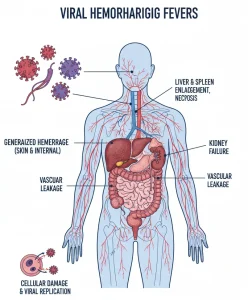Overview
Diagnosis
Diagnosing viral hemorrhagic fevers can be difficult in the early stages because the first symptoms, such as fever, muscle aches, headache, and tiredness, are common to many other illnesses. If you suspect you may have a viral hemorrhagic fever, contact your healthcare professional immediately and inform them before visiting any clinic or emergency room.
Your healthcare professional will review your medical and travel history and assess any possible exposure to infection sources. Be prepared to provide details such as:
-
Countries you visited and the dates of travel
-
Contact with animals like mosquitoes, ticks, rodents, nonhuman primates, or bats
-
Possible exposure to infected people or contaminated environments
Lab tests, usually using blood samples, are needed to confirm a diagnosis. These tests are conducted in specialized laboratories due to the high risk of transmission associated with viral hemorrhagic fevers.
Treatment
There is no specific cure for most viral hemorrhagic fevers, and treatment mainly focuses on supportive care to relieve symptoms and prevent complications.
Medications
-
The antiviral medicine ribavirin (Virazole) may shorten the course of some infections, such as Lassa fever.
-
Monoclonal antibody therapies like Inmazeb and Ebanga have been approved for the treatment of Ebola.
Supportive care
Supportive care helps the body recover and manage symptoms. This may include:
-
Receiving intravenous (IV) fluids to prevent dehydration
-
Restoring electrolyte balance to support nerve and muscle function
-
Monitoring vital signs and organ function throughout treatment
Procedures
In severe cases, kidney dialysis may be required. This procedure helps remove waste products from the blood when the kidneys are not functioning properly.
Preparing for your appointment
If you think you may have a viral hemorrhagic fever, contact your healthcare provider right away and inform them before arriving.
You can prepare for your visit by:
-
Writing down all symptoms and when they began
-
Listing your recent travel history and any animal or insect exposure
-
Bringing a list of medications, vitamins, and supplements you take
-
Preparing questions to ask your healthcare professional
What to expect from your doctor
Your healthcare professional may ask questions such as:
-
When did your symptoms begin?
-
Have you traveled recently to areas where viral hemorrhagic fevers are spreading?
-
Are your symptoms continuous or occasional?
-
How severe are your symptoms?
-
Does anything make your symptoms better or worse?
Providing detailed and accurate information will help your healthcare team diagnose and treat your condition effectively.
Advertisement

